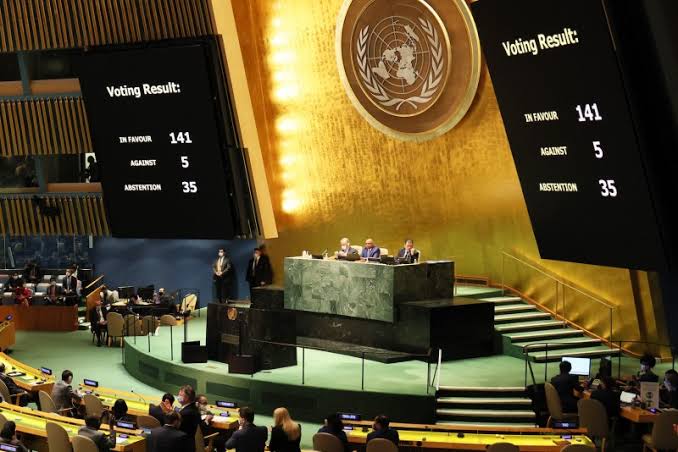The UN General Assembly overwhelmingly adopted a resolution on Wednesday, demanding that Russia immediately ended its military operations in Ukraine.
Known informally as the world’s “town hall”, the assembly is where all 193 UN Member States had a voice. A total of 141 countries voted in favour of the resolution, which reaffirmed Ukrainian sovereignty, independence, and territorial integrity.
It demanded that Russia “immediately, completely and unconditionally withdraw all of its military forces from the territory of Ukraine within its internationally recognised borders.”
The resolution was sponsored by more than 90 countries and needed a two-thirds majority in the assembly to pass.
Five countries – Belarus, the Democratic People’s Republic of Korea (more commonly known as North Korea), Eritrea, Russia and Syria – voted against it, while 35 abstained.
The voting capped off a rare special emergency session of the general assembly that began on Monday, during which countries took to the podium to declare their positions on the crisis, now entering a second week.
The UN Correspondent of the News Agency of Nigeria (NAN) reports that the agreement to hold the session was reached at an emergency special session of the general assembly to discuss the Ukraine crisis on Monday.
Although assembly resolutions were non-binding, they were considered to carry political weight as they expressed the will of the wider UN membership.
Assembly President, Abdulla Shahid, said at the session that the military offensive launched by Russia a week ago was a violation of the integrity and sovereignty of Ukraine.
Shahid cited the UN Charter, the Organisation’s founding document, which outlined a world where countries settled disputes by peaceful means, without the threat or use of force.
“The ongoing military offensive is inconsistent with this. It is an affront to the founders of this Organisation and everything it stands for.
“The violence must stop. Humanitarian law and international humanitarian law must be respected. And diplomacy and dialogue must prevail,” he said.
The general assembly had only held 10 emergency sessions since 1950, in line with the adoption of resolution 377A(V), widely known as ‘Uniting for Peace’.
The resolution gave the assembly power to take up matters of international peace and security when the Security Council was unable to act due to unanimity among its five permanent members – China, France, the United Kingdom, the United States, and Russia – who have the power of veto.

Related Posts
Add A Comment

